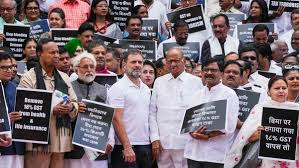
Table of Contents
The introduction and passage of the Waqf (Amendment) Bill, 2024, have stirred a significant controversy, drawing sharp criticism from opposition parties who have labeled it as “draconian” and an “attack .This article explores the opposition’s concerns, the content of the bill, and the broader implications of the debate.
Overview of the Waqf Bill
The Waqf Bill aims to reform the management of Waqf properties—those donated for religious or charitable purposes under Islamic law. The proposed amendments seek to enhance oversight, improve financial transparency, and streamline property management. The bill includes provisions for:
- Strengthened Oversight: Enhanced supervision by Waqf Bill boards to prevent misuse and ensure proper management of properties.
- Financial Reporting: Mandatory audits and detailed financial reporting to increase transparency and accountability.
- Dispute Resolution: Streamlined mechanisms for resolving disputes related to Waqf properties.
Opposition’s Critique
Opposition parties have launched a vigorous campaign against the Waqf Bill, framing it as a significant infringement on religious freedoms and an overreach by the central government.
Accusations of Draconian Measures
Opposition leaders argue that the bill imposes draconian measures on Waqf Bill institutions, which they claim are intended to undermine religious autonomy and centralize control. Key criticisms include:
- Centralization of Control: Critics argue that the bill centralizes control over Waqf properties, reducing the autonomy of local Waqf boards and communities. They contend that this shift undermines the traditional management practices and religious freedoms associated with Waqf properties.
- Increased Bureaucratic Oversight: The enhanced oversight mechanisms are seen as excessive, with opposition leaders arguing that they will lead to bureaucratic interference in religious affairs. This, they claim, will hamper the effective management of Waqf properties by local communities.
- Potential for Misuse: There are concerns that the increased control and financial scrutiny could be misused to target specific Waqf institutions or communities, further fueling fears of discrimination and marginalization.
Attack on Freedom of Religion
Opposition parties have framed the bill as an attack on freedom of religion, arguing that it infringes upon the rights of religious institutions to manage their properties according to their traditions and practices. Key points include:
- Religious Autonomy: The bill is criticized for interfering with the religious autonomy of Waqf institutions. Critics argue that it imposes government oversight on institutions that are traditionally managed according to religious principles, thereby encroaching on religious freedoms.
- Community Impact: Opposition leaders highlight the potential impact on local communities that rely on Waqf properties for religious and charitable activities. They argue that the bill’s provisions could disrupt these activities and undermine community trust in the management of Waqf assets.
Government’s Defense
In response to the opposition’s criticisms, the central government has defended the Waqf Bill, arguing that it is necessary for improving the transparency and efficiency of Waqf property management. Key points in the government’s defense include:
- Need for Reform: The government argues that the bill addresses long-standing issues of mismanagement and lack of transparency in Waqf property administration. They contend that the reforms are aimed at ensuring that Waqf properties are used effectively for their intended purposes.
- Enhanced Accountability: Proponents of the bill argue that the increased oversight and financial reporting requirements are essential for preventing misuse and ensuring proper utilization of Waqf assets.
- Consultation and Inclusivity: The government has emphasized that the bill was developed through consultations with various stakeholders, including Waqf boards and religious leaders. They argue that the reforms are intended to strengthen the management of Waqf properties while respecting religious sensitivities.
Political Reactions
The debate over the Waqf Bill has sparked significant political reactions, both within Parliament and among the public.
Parliamentary Debate
In Parliament, the bill has been the subject of heated debates, with opposition parties raising concerns and demanding revisions. Government ministers have defended the bill, highlighting its objectives and responding to the criticisms. The bill has faced scrutiny from various quarters, reflecting the contentious nature of the reforms.
Public and Media Response
The bill has also garnered substantial media coverage, with debates and opinions featured prominently in news outlets. Public reactions have been mixed, with some supporting the need for reform and others expressing concerns about the implications for religious freedoms.
Implications of the Debate
The controversy surrounding the Waqf Bill has several implications:
Impact on Religious Institutions
The bill’s potential impact on religious institutions and their autonomy is a central concern. The debate highlights the tension between regulatory oversight and religious freedom, with implications for how Waqf properties are managed and utilized.
Political Ramifications
The opposition’s strong stance against the bill reflects broader political dynamics and the contentious nature of governance issues. The debate has the potential to influence political alignments and public perception of the central government’s policies.
Future of the Bill
The future of the Waqf Bill will depend on the outcome of ongoing debates and potential revisions. The central government may need to address opposition concerns and seek a consensus to ensure the bill’s passage while mitigating criticism.
Conclusion
The Waqf Bill, with its proposed reforms and increased oversight, has become a focal point of controversy, with opposition parties denouncing it as draconian and an attack on religious freedoms. The debate reflects broader tensions between regulatory reforms and the protection of religious autonomy, highlighting the complexities involved in managing religious and charitable institutions.
As the discussion continues, the key will be balancing the need for transparency and effective management with respect for religious traditions and autonomy. The outcome of this debate will have lasting implications for the management of Waqf properties and the broader political landscape in India.









